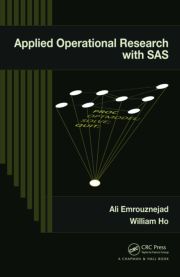Zerafat Angiz L, M., A. Emrouznejad and A. Mustafa (2012). “Fuzzy Data Envelopment Analysis: A Discrete Approach.” Expert Systems with Applications 39(3): 2263–2269.
Data envelopment analysis (DEA) as introduced by Charnes, Cooper, and Rhodes (1978) is a linear programming technique that has widely been used to evaluate the relative efficiency of a set of homogenous decision making units (DMUs). In many real applications, the input–output variables cannot be precisely measured. This is particularly important in assessing efficiency of DMUs using DEA, since the efficiency score of inefficient DMUs are very sensitive to possible data errors. Hence, several approaches have been proposed to deal with imprecise data. Perhaps the most popular fuzzy DEA model is based on ?-cut. One drawback of the ?-cut approach is that it cannot include all information about uncertainty. This paper aims to introduce an alternative linear programming model that can include some uncertainty information from the intervals within the ?-cut approach. We introduce the concept of “local ?-level” to develop a multi-objective linear programming to measure the efficiency of DMUs under uncertainty. An example is given to illustrate the use of this method.
(Source 1) |
(DOI) |
Zerafat Angiz L, M., A. Emrouznejad and A. Mustafa (2012). “Fuzzy Data Envelopment Analysis: A Discrete Approach.” Expert Systems with Applications 39(3): 2263–2269. . | (Source 2) |














